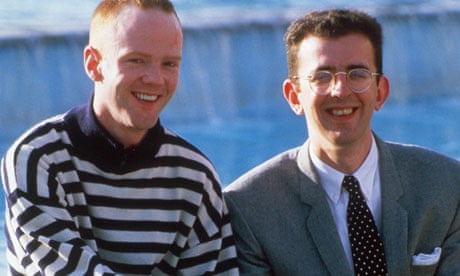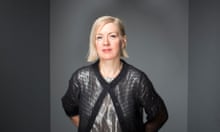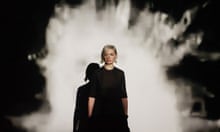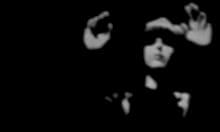Many former pop stars never quite leave the public eye – there's always a pub gig somewhere or a lucrative reunion tour. Others disappear without trace. But some go on to do something extraordinarily different. When the Stooges' early-1970s lineup reformed in 2009, the most curious aspect wasn't the return of a band whose last gig, in 1974, had ended in a hail of bottles and eggs, but the revelation that long-lost guitarist James Williamson had spent the intervening years as vice-president of technology standards for Sony. Similarly, Pentagon officials must be bemused to consult US missile defence systems analyst Jeff "Skunk" Baxter and discover that he had a previous life as guitarist in AOR supergroups Steely Dan and the Doobie Brothers. But what compels or enables pop stars to make such unlikely career shifts? And is a pop past a help or a hindrance? We talk to those who know.
David Rowntree
Then: Blur drummer
Now: Lawyer
I was never just the drummer in Blur – I always had something else going on, such as my work as an animator. Once when talking to some lawyer friends, asking them what their life was like, one of them suggested I should hang out at the Old Bailey. So I did, for two weeks. One of the court staff mistook me for Chris Evans. I shadowed a solicitor at a friend's criminal law firm – going to prisons and police stations – and absolutely loved it. It was a whole other world. I worked there while I was doing my legal training, representing people when they'd been arrested, being called out at 2am. It's incredibly difficult and often the whole case rests on what happens at the police station. I ended up back at the Old Bailey as a solicitor's representative working on a murder trial, one of the most fantastic times of my life. It meant something: somebody's life was on the line. I'm not sure the client knew I was the drummer from Blur, but I don't think they could have cared less: they're on trial for murder. They're not gonna care if it's bloody Mick Jagger.
Rev Richard Coles
Then: Keyboard player for 80s hitmakers the Communards
Now: Curate of St Paul's Church, Knightsbridge
We were the first generation of pop bands to come through for whom being gay didn't feel like an issue, but of course it was. I remember a Daily Telegraph leader which said: "The problem with Aids is it's not confined to homosexuals." It's a different world now, and it would be flattering to feel we contributed in some way. I did all the things that pop stars do. If you give someone aged 25 a lot of money and feed their ego, they behave extraordinarily badly. Your friends are on the dole and suddenly you're doing the Montreux pop festival or messing about with Roland Rat. People are always pleased to see you and tell you that you're marvellous. You get used to that in 30 seconds, but coming down from that takes much longer. The end of the band coincided with a very dark time: suddenly people around me were getting terribly ill [with Aids] and dying in their 20s. If you've encountered turbulence, maybe you yearn for a safe harbour.
I was a chorister when I was a kid, so I had breathed the atmosphere. But I'd always thought religion was all wicked nonsense. Suddenly I found myself attending church. I discovered that I needed it, as a human being. I'd done some broadcasting, where the fact that I'd been a pop star, wore glasses and played piano seemed to make people think I was a towering intellectual, but aged 30 I went to university to study theology, and eventually I got through selection as a priest. I actually think my pop past helps me all the time: you're performing all the time, the hours are long, people look at you funny, you dress up, and there's music. It's actually not dissimilar.
Louise Wener
Then: Singer with Britpop band Sleeper
Now: Author
I actually wanted to write books first, but then music came along. I'd wanted to be in a band for so long but the rise and fall was disconcertingly swift. When the band split, I went through something like a grieving process. Outside the band, I wasn't sure who I was. I worked on a solo album but my heart wasn't in it. I'd bought a secondhand electric typewriter and I used to tap away at the back of the recording studio, trying to wring out the beginnings of a novel. I wrote about 80,000 words, junked them and started again. And then I got excited because I thought I might have something worth showing to someone else. I sent the first three chapters of my first book to random agents. I'm sure the fact that I'd been in Sleeper meant my manuscript was plucked off the slush pile and read, but I felt very self-conscious about only being signed on the back of past glories. Writing requires more discipline than a three-minute pop song, but you don't have to fight with the band, the record company. Every time I see a great gig I want to get the band back together, but the feeling is fleeting. I'm much happier with the anonymity of writing. I think fame is a form of madness.
Terry Chimes
Then: Drummer on the first Clash album
Now: Chiropractor
As a kid, I preferred a microscope to a football for Christmas, but I got distracted by music and the option of joining the Clash seemed more fun than medical school. The punk scene was more about boozing than drugs, but I saw people deteriorating before my eyes and grew fed up with the arguments. I played with the Clash a second time when Topper Headon's drug use became a problem. Then, after the Clash, I played for Black Sabbath and Billy Idol. Once I was in Sun City with Black Sabbath and we went ten-pin bowling. After three hours, my shoulder locked up. They said they would find a chiropractor. This guy came in, cracked all my joints and I could move my arm again. It made a big impression.
I'd always known I wanted to heal people, so I enrolled on a chiropractic course in Bournemouth and didn't tell anyone who I was. But shortly afterwards they rereleased Should I Stay Or Should I Go. It was No 1 for three weeks, and of course, I'm in the video, so the secret was out.
Drums are the most hands-on instruments; chiropractic is the most hands-on medicine. You're manipulating people's spines. Mick Jones and Paul Simonon [from the Clash] have sent musicians to me for treatment, and I get some Clash fans.
There have been some funny moments. Once I was sitting in the car and the mobile went and this voice said: "Is that Terry Chimes Chiropractic? Terry Chimes who used to be in the Clash? This is the singer." It was Joe Strummer.
Peter Wishart
Then: Guitarist in Scottish rockers Runrig
Now: Scottish Nationalist party MP for Perth and North Perthshire
Before Runrig, I was in Big Country for a while, and we supported Alice Cooper when he had a snake onstage. I had a phobia and spent the whole time terrified of the snake. Eventually we were booted off the tour when the denim-clad metal kids booed our heartfelt Celtic anthems.
Runrig were a political band, which suited me as I had a strong trades-union and student politics background. Where other bands discussed sex and drugs, Runrig debated the Scottish constitutional question. When our former singer Donnie Munro stood for election in the late 90s and almost succeeded, the SNP leader Alex Salmond encouraged me to have a go. I knew entering politics would mean leaving the band, but I was approaching 40 and was ready for a new challenge.
I was elected in 2001, although I still play in parliamentary rock band MP4. People often say politics is show business for ugly people, and there is a lot in that statement: there is the rehearsing, preparation and performance, and you're dealing with the media. When I first stood for election there was quite a fuss because I'd been on Top of the Pops five times, but constituents just want you to do a good job.
Andrea Lewis
Then: Singer with the Darling Buds
Now: Runs children's theatre schools
The music thing all happened so quickly. I was only 19, and from the moment John Peel played us it went mad. We were pigeonholed with Transvision Vamp and the Primitives as blonde-fronted bands. We had some success, but Harley [Farr] the main songwriter and I went out together then split up while the band was still going. We fell out with our management and couldn't go on tour. I closed the door and never revisited it. It left a bad taste for 10 years. Aged 29 I went to drama school. I joined a theatre company and toured Europe. I had a radio show on BBC Wales and had children. Now I run children's theatre schools in Cardiff and Newport for 200 children. I've learned to trust my instincts. You get a lot of people saying to the kids: "You're going to be the next X Factor." I tell them my experiences, to put things into perspective. Last month we played a reunion gig for a friend of ours who passed away. We've all got kids now, and it wasn't half as painful as I expected, although Harley didn't want to do it. He's a nutritionist now.
Robert Dean
Then: guitarist in new romantic pioneers Japan
Now: Illustrator of ornithology books
Being in Japan in the late 1970s was an exciting time. But by the time the band were listening to Ryuichi Sakamoto and Yellow Magic Orchestra and actually thinking of moving to Japan, there wasn't much room for my guitar. I played with ABC and Gary Numan, and played with my own band in Australia, but I'd never really had a holiday. So I went to Peru and Bolivia and loved it; I went backpacking in South America, and eventually settled in Costa Rica.
As a kid I'd always been into wildlife, and in Costa Rica there's so much natural beauty. I started watching and then painting the birdlife, and now I illustrate and write books documenting it. I love it here and don't miss my past life. But it's funny, even out here you can never quite escape: I play in a local band, and sometimes people come up and say, "Weren't you in ...?" I seem to be seen as a major expert on South American birdlife now, although I'm not sure how that happened. I just made a conscious effort to change my life.
Mike Edwards
Then: Leader of indie dance hitmakers Jesus Jones
Now: Personal trainer
I decided early on that being cardiovascularly fit would prevent me losing my voice onstage. I got into cycling, which became a good method of transport in London when we were famous because you could get where you wanted without people on the tube going "I saw your interview this week." Cycling became such an obsession that I started racing. But as the band's career went down the tubes, I wondered what I'd ever do should Americans ever stop playing Right Here, Right Now, and remembered Mick Jagger saying that apart from music he was unemployable. I came across an advert asking "Have you ever fancied a career in fitness?" and I did. I enrolled on courses, I had clients. I now run a personal training business with a couple of trainers under my wing. The band thought I was nuts, but I was always the least rock'n'roll in the group. I use music a lot in classes but never Jesus Jones: it was a separate life. But being a pop star has helped. When I was first qualifying, the people around me were absolutely terrified, but after playing to 72,000 people at Wembley Stadium, doing exercises in front of 10 people was nothing.
David Emmanuel
Then: Early-80s reggae MC Smiley Culture
Now: Diamond mine manager
My hit single Police Officer was a true story – the police used to take my weed. It was better than being arrested, and I made that into a hit. With Cockney Translation I was a black man talking cockney. I integrated cultures even though I didn't understand it at the time. I was invited to meet the Queen, who said she listened to my records in the palace. Although I paved the way for people like the Streets and Dizzee Rascal, I left the music business because I wasn't rich. I first became aware of the possibilities for mining after visiting Grenada, where my mother comes from. Cockney Translation had endeared me to a lot of serious businessmen in the East End of London, and because of the records, I'd met a lot of influential people who helped me get investment. At school I thought diamonds came from vaults: now I've got gold and diamond mine concessions in Ghana, Uganda, Liberia, Kenya and the Congo, and I'm promoting a record for the Azerbaijan government. Recently, I bought an expensive car in cash, which resulted in a visit by the police. It was like Police Officer all over again.
Amelia Fletcher
Then: Singer with indiepop bands Talulah Gosh and Heavenly
Now: Chief economist and director of mergers at the Office of Fair Trading
I basically carried on my education so I could keep doing the band. I was studying philosophy and economics at Oxford when I was in Talulah Gosh and can remember asking for quiet rooms so I could do essays after soundchecks. Heavenly were even more academic: several of us got firsts. I did a masters, then a doctorate and by the end I was hugely overqualified. At that point I didn't think that I wanted to be an economist, but the qualifications I had pretty much meant I had to become one. I started in consultancy part-time, but then I got really into it. I don't think any of us quite believed in the band enough to give up our jobs and go for it. My work is quite serious, but my bands are fun. I tried to keep my background quiet because I thought it might compromise my gravitas, but a few people found out. Now I play in Tender Trap, and we were up for the 6Music votes-based playlist; I bit the bullet and emailed people at work and asked them to vote for us. Whenever the OFT gets involved in music – such as the planned merger between Live Nation and Ticketmaster – I have to withdraw because I might have a conflict of interest. It's funny, because it's the one subject I might know something about.
Peter Momtchiloff
Then: Guitarist in Talulah Gosh and Heavenly
Now: Senior commissioning editor at the Oxford University Press
I was never that career-minded, in music or anything else. Like most of my friends at Oxford, I'd just coast along. You didn't come out of university in debt like you do now. I got by on the dole and then I got a job in a record shop, where I met Amelia, and we formed the band. I did some freelance copy editing from home for two years so I could do music and go on tour. Eventually I joined the Oxford University Press as a desk editor and worked my way up. Now I publish philosophy books – talking to potential authors and working out who would be good to publish. I've been called "the world's most influential voice in philosophy publishing" in the Economist, but it was probably one of my friends who said that. I do publish more philosophy books than anyone else, but I have to take expert advice from philosophers on whether the stuff is good. I still play in bands, so in a way nothing changed. The weird thing about talking to philosophers is you expect them to be super-highbrow, but many of them are my generation, and a lot are indie music fans and nerds. I've been in the middle of the US talking to a philosopher, and they've suddenly gone all sheepish and said: "I probably shouldn't tell you this, but I've got all your records."







